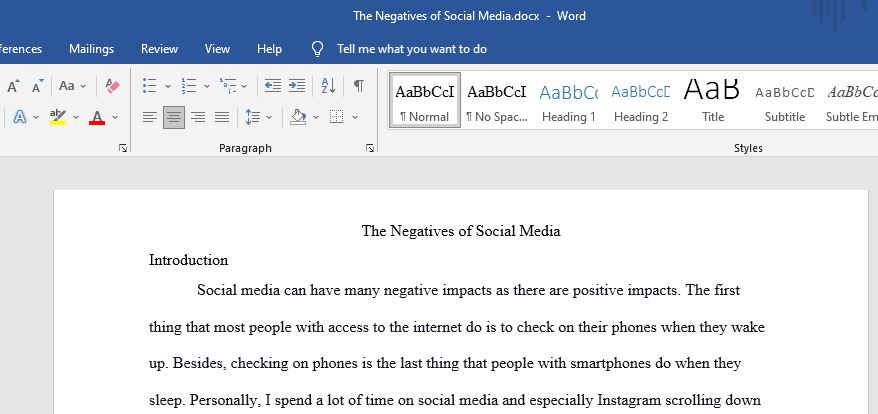Discuss The Negatives of Social Media
1) The Social Dilemma (Netflix documentary)
The documentary discusses how social media is manipulating us and leading to addiction. Our brains are being manipulated and even rewired by algorithms that are designed to get our attention and make us buy things, including buying into distorted ideas about the world, ourselves, and each other. Another main theme the documentary touches is our privacy. Social media is seducing us into spending time and sharing information so they can sell both. The documentary offers no solution, and it is left to the audience what they decide to do. The ultimate purpose I hope to make good use of this documentary is that we should question everything we read online, especially if it is presented to us in a way that reflects a detailed understanding of our inclinations and preferences. We should resist the “attention extraction model” that makes social media seem friendly and reinforcing, because everything we see online is carefully calculated to be presented that way. This text fits well into the discourse of our greater project because it highlights how social media is killing us. To be a better ancestor, we must pass down these cautions and stories to our future generations.
2) Depression in a Digital Age: The Highs and Lows of Perfectionism by Fiona Thomas – Ch 7: Instagram made me do it
The text discusses the unrealistic content from bloggers and how the author, Fiona, finds it problematic as no one talks about depression or anxiety on a blog. When she first downloaded Instagram, she was inspired to lose weight through hashtags and began to force herself to go on an extreme diet. She posted clean food online, but the struggles from behind the scenes were awful. It was a sudden realization when she thought about the influencer she followed were doing the same as she did: hiding dirty diet secrets. She unsubscribed everyone who made her feel bad about herself. In the end, her health and fitness journey was not perfect, and so was her fitspo identity online. The ultimate purpose I hope to make good use of this text is to think about our social presence, our imaginary online persona and how it is different from reality. I believe we are often lost about ourselves on social media because we are influenced by so many things we see online and trying to live up to a certain standard. This text fits well because our social presence is affecting people around us in some way, unaware and unintentionally. The lack of authenticity and truth to promote true positivity should be something to be considered in the class.
3) Depression in a Digital Age: The Highs and Lows of Perfectionism by Fiona Thomas – Ch 13: Online Obsession
The text discusses the author’s social presence and how she wanted to be more well-known online. She became addicted to her phone, checking notifications and email every morning. She wanted more likes, more comments and collaborations with big brands. She wanted more audience that could share her stories of mental illness. Therefore, she learned certain types of content that could attract more attention and started experimenting with different ways. In contrast, when she told her achievements to her colleagues, no one seemed to care. Imposter syndrome began to hit on her as she began to think no one enjoyed her writing and doubting herself whether she was really a mental health blogger. The ultimate purpose I hope to make good use of this text is to think about how much we value our online persona compared to our real identity. Are we being paranoid by social approvals and being likable, which led us to feel isolated and alone? This text fits well into the discourse of our greater project because it ties to how are our voices being heard. Everyone is now making conversations online, but face-to-face talking has become less valued. Our generation is now building online personas to communicate and to be valued in a way that is different from in person. We seem to think only well-known influencers get to raise their voices and receive attention.
Continue to write. Teacher do not require format and reference. U can use add some articles sources
Dont analyze the sources I provided. I just use them to support my topic. My topic is social media is bad, the main is Instagram. Then I divide into 3 parts. U can use more sources.
Talk about privacy. We do not have privacy Because our data is sold and controlled. And then depression, where we all compare and retoup and see only the good things on the Internet.
And the last one is that we’re all addicted because we want popularity and we want to see what other people post and we want to be validated and so on
Answer preview:

word limit:2256
